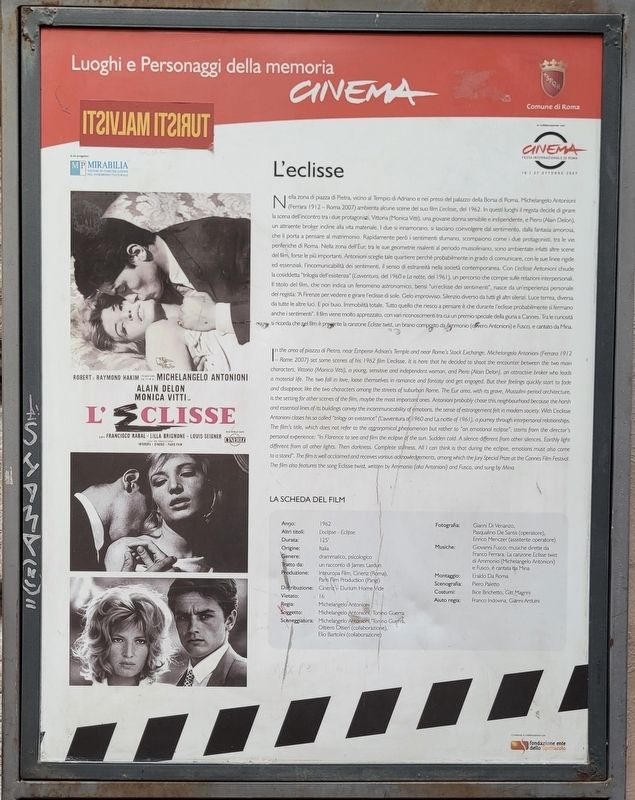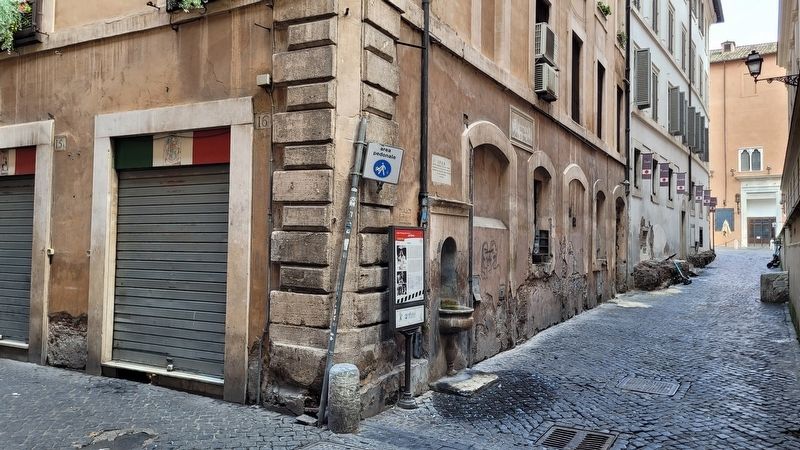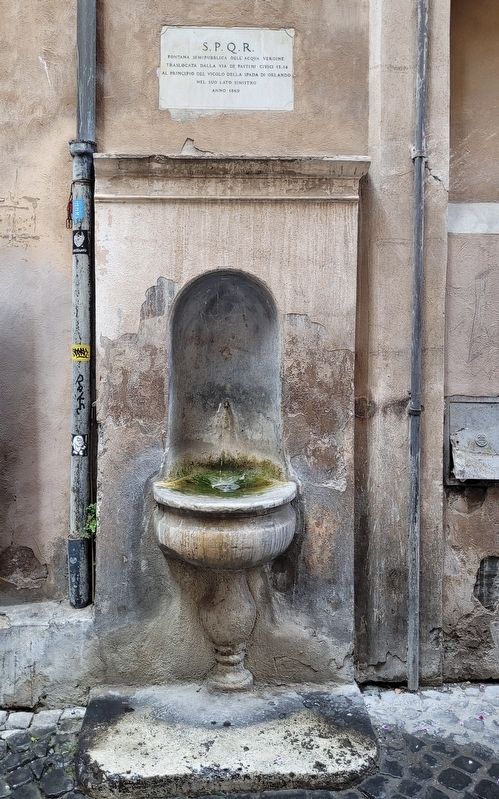Colonna in Roma in Città metropolitana di Roma Capitale, Latium, Rome, Italy — Central Italy (Tyrrhenian Coast)
L'eclisse / The Eclipse
Luoghi e Personaggi della memoria - Cinema / Places and characters of memory - Cinema
La Scheda del Film
Anno: 1962
Altri titoli: L'eclipse - Eclipse
Durata: 125'
Origine: Italia
Genere: drammatico, psicologico
Tratto da: un racconto di James Lasdun
Produzione: Inteuropa Film, Cineriz (Roma), Paris Film Production (Parigi)
Distribuzione: Cinenz Durium Home Vide
Vietato: 16
Regia: Michelangelo Antonioni
Soggetto: Michelangelo Antonioni, Tonino Guerra
Sceneggiatura: Michelangelo Antonioni, Tonino Gueña, Ottiero Ottieri (collaborazione), Elio Bartolini (collaborazione)
Fotografia: Gianni Di Venanzo, Pasqualino De Santis (operatore), Enrico Menczer (assistente operatore) Musiche: Giovanni Fusco; musiche dirette da Franco Ferrara. La canzone Eclisse twist di Ammonio (Michelangelo Antonioni) e Fusco, è cantata da Mina
Montaggio: Eraldo Da Roma
Scenografia: Piero Paletto
Costumi: Bice Brichetto, Gitt Magrini
Aiuto regia: Franco Indovina, Gianni Arduini
In the area of piazza di Pietra, near Emperor Adrian's Temple and near Rome's Stock Exchange, Michelangelo Antonioni (Ferrara 1912-Rome 2007) set some scenes of his 1962 film L'eclisse. It is here that he decided to shoot the encounter between the two main characters, Vittoria (Monica Vitti), a young, sensitive and independent woman, and Piero (Alain Delon), an attractive broker who leads a material life. The two fall in love, loose themselves in romance and fantasy and get engaged. But their feelings quickly start to fade and disappear, like the two characters among the streets of suburban Rome. The Eur area, with its grave, Mussolini-period architecture, is the setting for other scenes of the film, maybe the most important ones. Antonioni probably chose this neighbourhood because the harsh and essential lines of its buildings convey the incommunicability of emotions, the sense of estrangement felt in modern society. With L'eclisse Antonioni closes his so called "trilogy on existence" (L'aventura of 1960 and La notte of 1961), a journey through interpersonal relationships. The film's title, which does not refer to the astronomical phenomenon but rather to "an emotional eclipse", stems from the director's personal experience: "In Florence to see and film the eclipse of the sun. Sudden cold. A silence different from other silences. Earthly light different from all other lights. Then darkness. Complete stillness. All I can think is that during the eclipse, emotions must also come to a stand". The film is well acclaimed and receives various acknowledgements, among which the Jury Special Prize at the Cannes Film Festival. The film also features the song Eclisse twist, written by Ammonio (aka Antonioni) and Fusco, and sung by Mina.
The Profile of the Film
Year: 1962
Other titles: L'eclipse - Eclipse
Duration: 125'
Origin: Italy
Genre: Drama, Psychological
Based on: a short story by James Lasdun
Production: Intereuropa Film, Cineriz (Rome), Paris Film Production (Paris)
Distribution: Cinenz Durium Home Vide
Prohibited: 16
Director: Michelangelo Antonioni
Subject: Michelangelo Antonioni, Tonino Guerra Screenplay: Michelangelo Antonioni, Tonino Gueña, Ottiero Ottieri (collaboration), Elio Bartolini (collaboration)
Photography: Gianni Di Venanzo, Pasqualino De Santis (operator), Enrico Menczer (assistant camera)
Music: Giovanni Fusco; music directed by Franco Ferrara. The song Eclisse twist by Ammonio (Michelangelo Antonioni) and Fusco, is sung by Mina
Editing: Eraldo Da Roma
Scenography: Piero Paletto
Costumes: Bice Brichetto, Gitt Magrini
Assistant director: Franco Indovina, Gianni Arduini
Erected by Mirabilia.
Topics. This historical marker is listed in these topic lists: Arts, Letters, Music • Entertainment. A significant historical year for this entry is 1962.
Location. 41° 53.97′ N, 12° 28.678′ E. Marker is in Roma, Lazio (Latium, Rome), in Città metropolitana di Roma Capitale. It is in Colonna. Marker is at the intersection of Vicolo della Spada d'Orlando and Via dei Pastini, on the left when traveling north on Vicolo della Spada d'Orlando. The marker is located along the corner of the building. Touch for map. Marker is at or near this postal address: Vicolo della Spada d'Orlando, 118, Roma, Lazio 00186, Italy. Touch for directions.
Other nearby markers. At least 8 other markers are within walking distance of this marker. Trevi-Pantheon Route (within shouting distance of this marker); Hotel Pantheon (within shouting distance of this marker); a different marker also named The Trevi-Pantheon Route (within shouting distance of this marker); Rione III Colonna / Colonna District III (about 90 meters away, measured in a direct line); Hotel del Sole (about 90 meters away); Piazza della Rotonda (about 90 meters away); Pantheon (about 90 meters away); Albergo Cesari (about 180 meters away). Touch for a list and map of all markers in Roma.
Also see . . . L'Eclisse. Wikipedia
L'Eclisse (English: "The Eclipse") is a 1962 Italian romance film written and directed by Michelangelo Antonioni and starring Alain Delon and Monica Vitti. Filmed on location in Rome and Verona, the story follows a young woman (Vitti) who pursues an affair with a confident young stockbroker (Delon). Antonioni attributed some of his inspiration for L'Eclisse to when he filmed a solar eclipse in Florence. The film is considered the last part of a trilogy and is preceded by L'Avventura (1960) and La Notte (1961).(Submitted on July 24, 2023, by James Hulse of Medina, Texas.)
Credits. This page was last revised on July 24, 2023. It was originally submitted on July 23, 2023, by James Hulse of Medina, Texas. This page has been viewed 64 times since then and 19 times this year. Photos: 1, 2, 3. submitted on July 24, 2023, by James Hulse of Medina, Texas.


